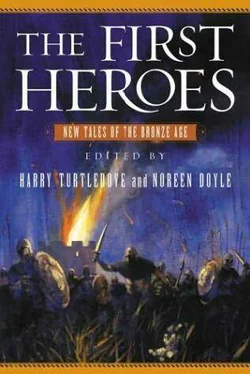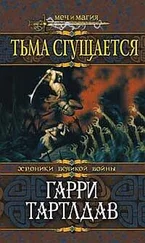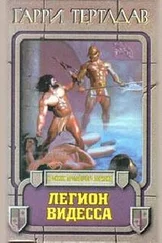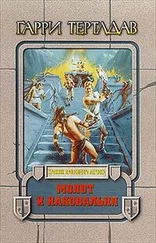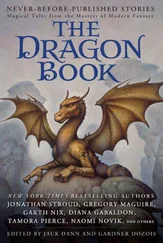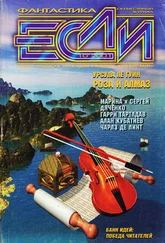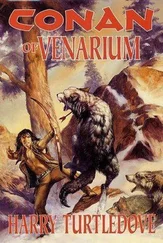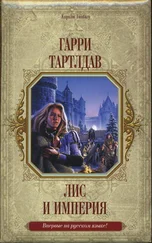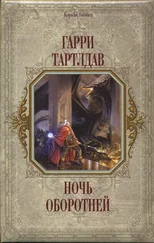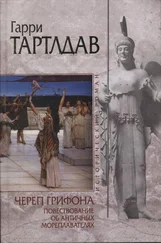Гарри Тертлдав - The First Heroes
Здесь есть возможность читать онлайн «Гарри Тертлдав - The First Heroes» весь текст электронной книги совершенно бесплатно (целиком полную версию без сокращений). В некоторых случаях можно слушать аудио, скачать через торрент в формате fb2 и присутствует краткое содержание. Жанр: Фантастика и фэнтези, на английском языке. Описание произведения, (предисловие) а так же отзывы посетителей доступны на портале библиотеки ЛибКат.
- Название:The First Heroes
- Автор:
- Жанр:
- Год:неизвестен
- ISBN:нет данных
- Рейтинг книги:3 / 5. Голосов: 1
-
Избранное:Добавить в избранное
- Отзывы:
-
Ваша оценка:
- 60
- 1
- 2
- 3
- 4
- 5
The First Heroes: краткое содержание, описание и аннотация
Предлагаем к чтению аннотацию, описание, краткое содержание или предисловие (зависит от того, что написал сам автор книги «The First Heroes»). Если вы не нашли необходимую информацию о книге — напишите в комментариях, мы постараемся отыскать её.
The First Heroes — читать онлайн бесплатно полную книгу (весь текст) целиком
Ниже представлен текст книги, разбитый по страницам. Система сохранения места последней прочитанной страницы, позволяет с удобством читать онлайн бесплатно книгу «The First Heroes», без необходимости каждый раз заново искать на чём Вы остановились. Поставьте закладку, и сможете в любой момент перейти на страницу, на которой закончили чтение.
Интервал:
Закладка:
"It was an oracle," he says.
Another oracle? I wondered silently.
"The oracle said Agamemnon would never take Troia without the aid of Achilleus, so he sent ambassadors to promise Achilleus anything he wanted if he'd sail to join his army at Troia. Now that he's here, Priamos's walls won't stand for long!"
"Surely, with more soldiers, there will be less booty for each man," I remarked casually.
"They say that when we finally sack Troia there will be more than enough for everyone. Me, I wonder how much treasure is left in Priamos's storehouses. At least I won't have to be the one to divide it up between the leaders. Of course Menelaos will finally get his wife back, though by now she must be an old woman. But they say Priamos has twelve daughters, all beautiful as goddesses.
So who will get which one of them as his share? That's Agamemnon's job, and he's welcome to it.
He'd just better not slight Achilleus—there's one man who's quick to take offense!"
"Speaking of dividing the loot. . . " I suggest, but Glaukos has to apologize that he has such scant takings to offer for sale. With more fighting men arriving to join in the war, more merchants are following them, eager for a share of the spoils. They are driving prices higher. But there are also more men joining the Wilusan side of the conflict. Men say that a large company of warriors have come across the straits from Thrace to get their share of Priamos's silver. "Much good it will do them in their graves," Glaukos says boastfully, "after they meet Achilleus and his Myrmidons in battle."
I will say that Glaukos was right about this Achilleus—his presence has rallied the Achaians, and they press harder at the defenses of Troia. He was right, too, about Achilleus being quick to take offense. Already, he has been quarreling with Agamemnon. "Over women, what else?" says Glaukos.
These disputes within the Achaian camp sometimes made me wonder if the various factions might be made to turn on each other, which could only be to the advantage of Hektor. I must consider a scheme which could bring this about.
Now plague has struck the Achaian camp.
Such diseases spread quickly. The sickness is striking down kings and common men both, great warriors and their captives. I hear rumors that both Agamemnon and Achilleus are afflicted, that they lie groaning with fever in their huts. "The anger of the gods," men are saying fearfully. The Achaians are making great sacrifices and prayers in an attempt to appease whatever god has sent this affliction.
But I have seen such plague in many camps where soldiers are crowded together for long periods of time, as they are when conducting a siege. I cannot say this outbreak was unexpected—by me.
Yet perhaps the plague is indeed the answer the gods have finally decided to give the Wilusans after their many prayers and sacrifices. Now I wonder how they will take advantage of this gift.
Hektor has acted quickly, as I expected. With the Achaians stricken by plague, he has mounted a counterattack with all the forces he commands. His chariots have again driven back the Achaians from the walls of the citadel, back toward the sea. It is desperate battle. The Achaians, despite their weakness, defend their ground savagely. The Wilusans and their allies have to pay in blood for every spear's-length gained on that battlefield, but at last the invaders have found themselves with their backs against the rampart guarding their ships.
It is night now, as I write this. The plain is glowing with fires lit in both camps as sentries keep watch for the movements of the enemy and other men lie sleepless, waiting for dawn and the resumption of battle. I am not there with them in their camps, but I know it is so, for I have seen many battles in my lifetime.
The Achaians have retreated to their ships, behind their rampart and ditch, but I can see no sign that they mean to retreat farther, to abandon the siege and sail away to their homeland. For Hektor, this is the chance for victory finally granted him by the gods. Tomorrow's fighting may end this war at last.
All day the armies have battled at the earthen rampart protecting the Achaian ships. It is the invaders who are now forced onto the defensive, to fight from behind their walls. The ships—they are the prize. If the Wilusans can manage to burn the Achaian ships, Agamemnon's army will be trapped on the shore with no way of escape. But the Achaians defend them with fierce desperation.
All day the battle has gone first one way, then the other. At least once Hektor's men broke over the wall and began to set fire to the ships, but the Achaians threw them back, at great cost in life to both sides. Savage fighting! The Wilusans have left their chariots behind in their camp. This is close combat, where a man will find his face spattered with his enemy's warm blood and trample his companion's entrails underfoot as he struggles to press forward. Men use their shattered spearshafts as clubs, they pick up rocks from t he ground to shatter the skulls of their enemies.
There will be no captives for sale at the end of this day's fighting. There will be no ransom, no quarter given, no mercy. No one would hear such an appeal over the din of clashing bronze, the screams of wounded and dying men.
Such a terrible thing is war!
Now it seems that the gods have turned against the people of Troia. Their great war-leader Hektor is dead, and once again the Achaian forces are at the walls of the citadel.
Even before dawn, the sound of men arming for war could be heard across the battle plain. All through the night, I could hear the groaning of dying men as they lay in the dark with the stiffening corpses of companions and enemies who had gone ahead of them into death. So hard the fighting had been, so long, that the armies had not been able to gather in all the bodies.
Then at dawn came the Achaian charge. The Wilusans had again kept their chariots in the rear, anticipating another day of close fighting. But the Achaians put their chariots at the spearhead of the attack, led by the formidable Achilleus. They cracked the Wilusan line, with the great mass of their footsoldiers rushing in behind.
Men who have been in battles know this moment, when the line breaks, when men see their companions falling on either side, and others fighting beside them begin to look nervously toward the rear. A man can hold firm then, he can take a tighter grip on his sword or spear and call to his companions to stand fast against the enemy. He can press forward, hoping they will follow. Or he can turn and run.
This is how armies die, when men panic, when they try to flee death. Rout is the older brother of defeat.
At the center of his line, Hektor tried to rally his soldiers, he strode forward to meet the Achaian charge. But the force of the Achaian assault was too great. One after the other, the men who had followed him fell to the spears of the enemy, and Hektor was forced to give ground.
The army of Troia broke and ran for the citadel, but few of them ever reached the safety of the gates. Behind them in their chariots came the vanguard of the Achaian host in bloodthirsty pursuit. One after another, men fell with Achaian spears through their backs.
Some of the Wilusans, cut off in their retreat, turned to flee across the river called Skamandros to what they imagined was the safety of its far bank. But Achilleus pursued them, he and his men cutting down so many that the bodies dammed the sluggish summertide flow and the river became a lake of blood.
As the panicked survivors of Troia's army fled through the gates, a small company of brave men, led by Hektor, made a fighting retreat, attempting to hold back the enemy. One by one they fell into the dust under the feet of the Achaians battling their way forward. At last, as the enemy was almost at the western gate, threatening at any moment to break through, the men inside managed to swing it shut and bar it.
Читать дальшеИнтервал:
Закладка:
Похожие книги на «The First Heroes»
Представляем Вашему вниманию похожие книги на «The First Heroes» списком для выбора. Мы отобрали схожую по названию и смыслу литературу в надежде предоставить читателям больше вариантов отыскать новые, интересные, ещё непрочитанные произведения.
Обсуждение, отзывы о книге «The First Heroes» и просто собственные мнения читателей. Оставьте ваши комментарии, напишите, что Вы думаете о произведении, его смысле или главных героях. Укажите что конкретно понравилось, а что нет, и почему Вы так считаете.
